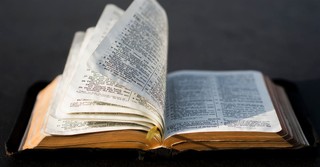Who Decided What Went into the Bible?
Share

1. Was the book written by a prophet of God?
2. Was the writer confirmed by acts of God?
3. Does the message tell the truth about God?
4. Did it come with the power of God?
5. Was it accepted by God’s people?
These are the marks of canonicity. “Canon” is a Greek word meaning “rule” or “measuring stick.” These five questions are used to determine which books “measure up” to being labeled divinely inspired. They exhibit “the marks of canonicity.”
Turn to a Bible’s table of contents and you’ll see that each of the books was written by either a prophet or apostle (
Miracles were the means by which God confirmed the authority of his spokesmen. In
Truth cannot contradict itself, so agreement with the other books of Scripture was only logical. As was historical accuracy. If the facts of a book were inaccurate, it couldn’t have been from God.
The inner witness of the Spirit was equally important. A key question these early Christians asked was, When we read this, is there an inner sense from God that what is written is right and true?
Initial acceptance by people to whom the work was addressed was crucial. What was the original audience’s sense? Did they accept the book as an authoritative word from God? Daniel, who lived within a few years of Jeremiah, called Jeremiah’s book “Scripture” in
Even before Marcion and Montanus, the church was aware of these important criteria. In A.D. 96, Clement of Rome wrote “The apostles were made evangelists to us by the Lord Christ; Jesus Christ was sent by God. Thus Christ is from God and the apostles from Christ. . . . The Church is built on them as a foundation” (1 Clement 42).
After Marcion and Montanus, lists of New Testament books begin to appear. One of the first was The Muratorian Fragment. It was discovered among the Vatican’s sacred documents by historian Ludovico Antonio Muratori in 1740 and dates to about A.D. 190. The fragment is damaged. The portion we possess begins with “the third book of the Gospel is that according to Luke.” We assume the first and second Gospels to be Matthew and Mark. The fragment lists John, Acts, all of Paul’s letters, James, 1-2 John, Jude and the Revelation of John. It also includes the Revelation of Peter, the Wisdom of Solomon and (“to be used in private, but not public worship”) the Shepherd of Hermas.
By the early third century only a handful of books that we now call our New Testament were in question. In western regions of the empire, the book of Hebrews faced opposition, and in the east Revelation was unpopular. Eusebius, a church historian of the fourth century, records that James, 2 Peter, 2-3 John and Jude were the only books “spoken against” (though recognized by others).
In 367, Athanasius, the bishop of Alexandria, wrote an Easter letter that contained all twenty-seven books of our present New Testament. In 393 the Synod of Hippo affirmed our current New Testament, and in 397 the Council of Carthage published the same list.
Theologians are careful to note that the church didn’t develop the canon, God did that by inspiring its writing and superintending each book’s preservation. The church recognized the canon by experience and mutual agreement.
Read
1. What is “the prophetic message as something completely reliable”?
2. What are we supposed to do with “the prophetic message”?
3. Where did the prophecies of Scripture come from?
4. What does chapter three of The Bible Questions make you want to do?
Taken from The Bible Questions by Hal Seed. Copyright(c) 2012 by Hal Seed. Used by permission of InterVarsity Press, P.O. Box 1400, Downers Grove, IL 60515. www.ivpress.com
Photo credit: Unsplash/Aaron Burden